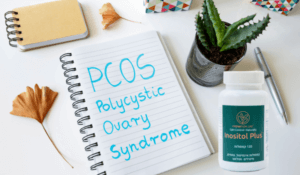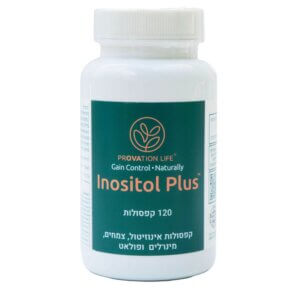
Symptoms of PCOS
Women with PCOS typically present a range of symptoms:
- Infrequent, irregular, or prolonged periods
- Visible signs like excess body hair (hirsutism), severe acne, and hair thinning on the scalp.
- Weight gain
- Infertility due to issues with ovulation
While the exact cause of PCOS remains unknown, several factors are thought to play a role in its development:
- Insulin resistance results in elevated insulin levels, which stimulate the ovaries to produce more male hormones (androgens).
- A hormonal imbalance between hormones like androgens, luteinizing hormone (LH), and follicle-stimulating hormone (FSH).
- Genetics.
- Chronic low-grade inflammation which can contribute to increased production of androgens.
How does metformin help women with PCOS?
In this blog, we are focusing on how metformin became one of the leading medications prescribed to handle the symptoms of PCOS. Metformin was originally developed to treat type 2 diabetes and grew to be the preferred option for that condition until the advent of the newer generation of GLP-1 agonists like Ozempic and Mounjaro. Metformin was also often prescribed off-label to treat women with PCOS. This was primarily due to the lack of other specific therapies for the condition, and so far, metformin has never received FDA approval.
Metformin improves insulin resistance and regulates menstrual cycles, which is important in managing PCOS. However, its effectiveness can vary from person to person, which means it must often be used alongside other treatments like lifestyle adjustments, hormonal therapy, and fertility medications. Women with PCOS were advised to be aware of both the advantages and limitations of metformin so that they could make informed choices.
What are the limitations of metformin in the treatment of PCOS
While metformin may offer benefits to many women dealing with PCOS, it is not a universal solution and comes with its own set of limitations.
- Metformin’s impact varies from person to person. Some women may notice significant improvements, while others might experience only slight changes.
- Metformin brings with it common side effects, including gastrointestinal problems such as nausea, diarrhea, and abdominal discomfort.
- Although metformin can help lower insulin levels, its ability to reduce androgens may not be enough for many women, leading to the need for additional treatments.
- Metformin is not specifically formulated for weight loss; its effects in this area are modest.
- While metformin may enhance ovulation rates, it might not be as effective as other fertility treatments like clomiphene or gonadotropins.
Enhancing metformin with Inositol Plus for PCOS 
While metformin is a commonly used treatment for PCOS, it has limitations. Inositol Plus offers a complementary approach, addressing key areas where metformin falls short.
Inositol Plus is an over-the-counter supplement that combines ten essential naturally occurring substances – Myo-inositol, chromium, cinnamon, red yeast, magnesium, potassium, zinc, folic acid, turmeric, and Coenzyme Q10 (CoQ10). Myo-inositol supplementation works to restore the balance between hormones and to improve ovarian function and the stability of menstrual cycles in PCOS patients. In parallel with these positive effects on ovulation, Inositol Plus plays a crucial role in insulin signaling and can improve insulin sensitivity. Other ingredients play a role in improving cardiovascular health and may help reduce high blood pressure, which can be caused by PCOS.
How metformin supplemented with Inositol Plus functions in diabetes
Metformin is mainly used to manage type 2 diabetes by improving how the body responds to the naturally produced insulin. In doing so, it lowers the high blood sugar levels. Myo-inositol with berberine operates similarly. Together, they produce these benefits:
- Metformin decreases the liver’s glucose production, helping to lower blood sugar levels.
- It improves the body’s reaction to insulin, allowing cells to take up glucose more effectively.
- Metformin slows down glucose absorption in the intestines.
- Myo-inositol plays a key role in insulin signaling, while chromium boosts insulin’s effectiveness and may support better blood sugar regulation.
When it comes to the specific mechanism of the two drug’s action in women with PCOS, they target various key factors related to PCOS;
- By boosting insulin sensitivity, they help lower insulin levels, potentially reducing androgen production by the ovaries.
- Lowered insulin levels and better hormonal balance result in more regular menstrual cycles.
- Enhanced hormonal regulation increases the chances of ovulation, which is beneficial for fertility.
- Metformin is not specifically designed for weight loss, but its influence on insulin and glucose functions can assist some women with PCOS manage their weight effectively.
Other approaches for dealing with the symptoms of PCOS
There are some recognized treatment options, as well as metformin, but they generally address only one of the many aspects of PCOS:
- Lifestyle changes, such as weight loss through healthy eating and increased physical activity, can enhance insulin sensitivity and promote hormonal equilibrium. Together, these can alleviate some of the symptoms.
- Medications like Aldactone can decrease androgen levels and ease unwanted hair growth and acne symptoms. It can be prescribed off-label in cases of women with PCOS when there has been extreme hair growth (hirsutism) and no other treatments have succeeded.
- Restoring fertility and increasing the chance of pregnancy is an important target. There are a few different potential treatments that address this single aspect of the condition:
- Oral contraceptives (birth control pills), such as Belara, directly influence hormone imbalance and reduce the levels of androgens. This can help regulate menstrual cycles and address issues like acne and excessive hair growth.
- Clomid is commonly prescribed to induce ovulation in women with PCOS who are attempting to conceive.
- A laparoscopic procedure known as ovarian drilling can induce ovulation by reducing the production of androgens.
- After all else fails, hormonal injections can stimulate ovulation for individuals not responsive to the other treatments.

















